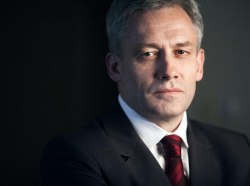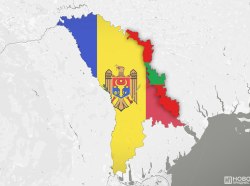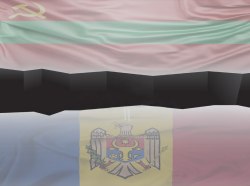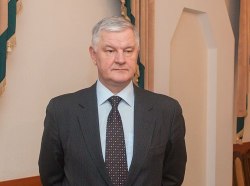The Military and Historical Memorial in Bendery is full of dignity and solemnity due to the white colonnade topped with the Russian eagle at the entrance, black granite gravestones and crosses on the military graveyard. A bit further there is a Triumphal arch to the Russian military victory over Turkey.
The Alley of Generals
In the centre of the Memorial, there is The Alley of Generals with two opposite rows of massive black gravestones. It seems as though the Generals keep the line.
- It is a tomb of the Major General Timofey Ivanovich Zbiyevsky, - the Inspector of Scientific Department of the Historical Complex "Bendery Fortress" Alexander Bulgakov tells. - The hero of the Patriotic War of 1812, he came from a family of rather poor Polish Szlachtich. He began soldiering in 1783, battled against Turks in 1788 at a siege of Ochakovo, Kaushany, Akkerman, Izmail participated in the capture of the Bendery fortress. In November 1805 for exemplary action near the Austerlitz and personal courage, the Commander of the Vladimir Musketeer Regiment was awarded the Order of Saint George and marked out by the major general's rank. In 1815 Zbiyevsky became the Commandant of the Bendery fortress. Here ended his way of the warrior.
Nearby grave contains the remains of the Major General Fedor Dolgovo-Saburov, the Chief of the Danube Artillery Garrison. The descendant of the most ancient seigniorial family during the service participated in 13 campaigns against various foes of Russia — the French, the Persians, the Turks. Another Hero of the Russian Empire - the Commander of the Sevsky Infantry Regiment Major General Foma Luzanov who battled against mountaineers of the Caucasus, the Turks and the Polish rebels is also buried in Bendery.
Kingdom of heaven to you, brave warriors of a great era, faithful soldiers of the Empire, moved it apart to the borders which we, descendants, could not hold, having distributed at the end of the 20th century for a penny the lands watered with your blood...
"Took part in a siege and assault of the Bendery fortress"
Two huge empires – Russian and Ottoman - several centuries battled for lands and the people. In the period of Catherine the Great, the pendulum had swung towards Russia. This period put forward the whole group of powerful statesmen, commanders, talented nuggets. Many participants of the well-known fights of that time passed through Bendery.
By the way, Yemelyan Pugachev under the command of the general-in-chief Pyotr Panin took part in the first assault of the Bendery fortress in 1770. During the attack, the dashing сossack was the first who overcame the Turkish paling and a checker the Janissary cut through "glade" in the crowd, for what he was granted in officers. Much later, when the Pugachevsky Revolt was suppressed, and Yemelyan was captivated, Catherine II specially appointed Panin the Head of the Commission investigating crimes of rebels.
The first asked question on interrogation was whether it was the truth that "thief Yemelka" served under his supervision? "Yes, your Excellency, I took part in a siege and assault of the Bendery fortress", - Pugachev answered the Count Panin.
After that victory, the Russian troops moved from Moldova to Ukraine, and during the campaign, the Captain of the Cossack army Yemelyan Pugachev helped several companions to move to Don arbitrarily. For that, he was arrested and transported under the guard to Kazan. From there he escaped to the Urals and had conducted a bloody rebellion...
The general cavalryman Yakov Kulnev, the legendary soldier of the period of wars with Napoleon, the person of exclusive bravery and nobility, also started his service in Bendery. The captain of the St. Petersburg Dragoon Regiment participated in a fortress siege in 1789. The courage shown by the young officer was noticed by the Lightest Prince Potemkin, and on his patronage, the captain started an outstanding military career.
Mihail Barclay de Tolly, future Minister of War of the Russian Empire, and then the Commander of one of the regiments participated in the same siege. The Princes Wittgenstein also left the mark in Pridnestrovian history. The German Count Khristian-Ludwig-Kasimir passed into the Russian service in 1761 and made an impudent prospecting campaign on the Bendery fortress with a large group in five thousand riders even trying to take control of it in 1769. It was he who managed to collect data on the strengthening of the fortress and its garrison. This information influenced tactics of the army of Panin by preparation for a siege and storm.
Christian Wittgenstein could not take part in the storm because of the illness. His son Peter Khristianovich after Kutuzov's death headed the Russian army in Patriotic War of 1812 and after its termination received as a present from the emperor Alexander I a manor Kamenka. Now it is the city in Pridnestrovie. There he retired general created one of the best resorts of the Russian Empire and broke the well-known started terraces which remained till nowadays. Due to the efforts of the Wittgenstein family, these lands were called "the Russian Switzerland".
The temple of the troops and Emperors
The Russian soldiers constructed Saint Alexander Nevsky's Church in the Bendery fortress. Hussars and grenadiers, second lieutenants and generals, emperors Nicholas I and Alexander II prayed there. The last All-Russian autocrat Nicholas II with the spouse Aleksandra Fiodorovna, Crown Prince Alexey and daughters prayed here in the spring of 1916.
Choosing by a cap
At the central entrance to the military and historical memorial, the monument to the Lightest prince Grigory Aleksandrovich Potemkin-Taurian is established. The bronze prince stays in all his giant growth, in a wig and a ceremonial uniform, watches in far away, only to him visible distance somewhere...
Russia appearance on the coast of the Dniester is totally Potemkin's merit. He believed here to be the beginning of a way to the execution of the "Greek project" designed to establish the Russian dominion in the Balkans, and after and to recreate the Byzantine Empire under Russian name. The project on which the second grandson of Catherine the Great Konstantin Pavlovich had to become a new bazilevs did not succeed. But fast and successful development of desert open spaces of Northern Black Sea Coast, strong fixing of Russia on these lands is truly successful Potemkin's projects.
- Potemkin thought up an effective demographic method: retired officers and soldiers received allotments on the attached lands, - the Director of Scientific work of the Military and Memorial Complex "Bendery Fortress" Georgy Vilkov tells. - Every five retired soldiers had to found the village. Especially for them, brides from provinces of central Russia were brought. It was a peculiar way to chose future husband: grooms had to polish the soldier's caps to gloss and put them on peaks. The girls decided what cap they prefer most of all. The owner of the chosen cap became her husband.
Now it causes bewilderment or a smile, but then it allowed to master the huge open spaces from the Southern Bug to the Dniester in the shortest possible time. Besides, Potemkin issued the Decree under which all runaway serfs who managed to reach these lands, became free.
Potemkin saw the state advantage in the difficulty of life in these regions. Those who managed to reach here would be able to survive as only strong and courageous people can do it.
- After the Pugachev's rebellion Potemkin reflected over his reasons, - Vilkov says. - He admitted the shortage of arable lands in Central Russia. But he failed to convince landowners to weaken an oppression burden on peasants, or to release them. Here, in deserted Black Sea Coast and on the coast of the Dniester, free people built their life.
... In 1791 the Treaty of Jassy finished a series of the Russian-Turkish wars. Now the border of the Russian Empire passed across the Dniester. The Lightest Prince came back to St. Petersburg from nowadays Romanian Jassy - this days capital of the Moldavian principality. Near a crossing through the Dniester, at the town of Stavuchana, having a presentiment of the death, he ordered to stop and take himself out from the carriage.
His last words were "I wish to see the sunlight".
Monument to Great Victories
- The memorial complex in our city originally meant to be the place of memory, an element of historical and architectural style of the city, but it turned out to become one of the largest monuments to the history of Russia in the territory of the former Soviet Union, - Georgy Vilkov says. - Search groups and historians worked hard in archives to establish more than five thousand names of the soldiers and officers of the Russian Imperial army buried at the military cemetery in Bendery.
Researches which open new details of nice pages of the history of great wars and great victories of Russian Empire continue.
Source: Zvezda weekly. Author: Alla Gribinyuk








